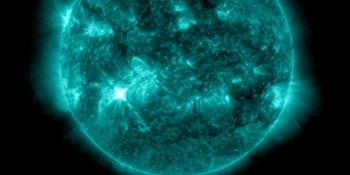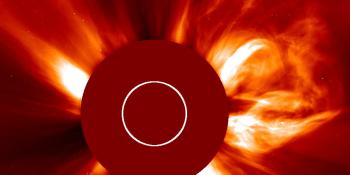Visualizzazione archivio di giovedì, 18 aprile AM
Rapporto attività solare
Ogni brillamento solare menzionato nel rapporto ha un fattore di scala, applicato dal Centro di Predizione Meteorologica Spaziale (SWPC). A causa del fattore di scala del SWPC, i brillamenti solari sono segnalati come ridotti del 42%, rispetto ai dati di qualità scientifica. Il fattore di scala è stato rimosso dai nostri dati archiviati sui brillamenti solari, per riflettere le unità fisiche reali.
Rapporto dell'Attività Geofisica Solare 2002 Apr 18 2200 UTCPreparati dal SWPC della NOAA© ed elaborati da SpaceWeatherLive.com
Rapporto Congiunto USAF/NOAA dell'Attività Solare e Geofisica
SDF Numero 108 Emesso alle 2200Z il Apr 18 2002IA. Analisi delle Regioni Solari Attive e Attività dalle 2100Z-17 alle 2100Z-18 Solar activity was low. Only C-class flares occurred
over the past 24 hours. Some of these flares did not have an obvious
source on the visible disk and may have originated from beyond the
limb. Region 9906 (S14W55) remains large and complex but has shown
some sunspot decay and magnetic simplification. New Regions 9911
(S13E23) and 9912 (N11E28) were numbered.
IB. Previsione dell'Attività Solare
Solar activity is expected to be
moderate. M-class activity is expected in Region 9906. A major flare
in this region remains a possibility.
IIA. Sommario dell'Attività Geofisica dalle 2100Z-17 alle 2100Z-18
The geomagnetic field ranged from quiet to severe storm levels in
response to the CME that impacted the Earth early yesterday. ACE
solar wind information suggests that this CME has passed. The
geomagnetic field is currently at active levels. Yesterday's greater
than 10 MeV proton event has ended: start 17/1530 UTC, maximum flux
(24 pfu) 17/1540 UTC, and end 18/0035 UTC.
IIB. Previsione dell'Attività Geofisica
The geomagnetic field is
expected to be at unsettled to active levels through the end of 18
April UTC. Another CME is expected to impact the Earth early on 19
April UTC from an LDE/CME that occurred on 17 April. Minor to major
storm conditions are possible for the 24-48 hours following this
CME's arrival. Geomagnetic activity is expected to decline to
unsettled to active levels by the end of the 3-day forecast period.
Another greater than 10 MeV proton event is possible if Region 9906
generates a major flare.
III. Probabilità dell'Evento dalle Apr del 19 alle Apr del 21
| Classe M | 75% | 50% | 40% |
| Classe X | 10% | 05% | 01% |
| Protone | 10% | 05% | 01% |
| PCAF | yellow | ||
IV. Flusso di 10.7 cm di Penticton
Osservato 18 Apr 188 Previsto 19 Apr-21 Apr 180/175/170 Media di 90 Giorni 18 Apr 201
V. Indici Geomagnetici A
Osservato Afr/Ap 17 Apr 027/041 Stimato Afr/Ap 18 Apr 045/050 Previsto Afr/Ap 19 Apr-21 Apr 040/040-030/050-012/020
VI. Probabilità dell'Attività Geomagnetica dal 19 Apr al 21 Apr
| A. Latitudini Medie | |||
|---|---|---|---|
| Attivo | 50% | 50% | 30% |
| Tempesta minore | 30% | 20% | 10% |
| Tempesta maggiore-grave | 20% | 10% | 05% |
| B. Latitudini Alte | |||
|---|---|---|---|
| Attivo | 35% | 50% | 30% |
| Tempesta minore | 40% | 30% | 20% |
| Tempesta maggiore-grave | 25% | 15% | 05% |
Tutti gli orari in UTC
<< Vai alla pagina della panoramica giornaliera
Ultime notizie
Ultimi messaggi dal forum
Coronal mass ejection impact and G4 geomagnetic storm 10 & 11 October 2024 935AR 3938 21AR 13933 9AR 13932 89AR13936 6
Altri argomentiSupporta SpaceWeatherLive.com!
Molte persone vengono su SpaceWeatherLive per seguire l'attività del Sole o sapere se ci sia la possibilità di vedere l'aurora, ma a maggior traffico corrispondono costi maggiori. Considerate una donazione se vi piace SpaceWeatherLive così che possiamo mantenere online il sito web!

Notizie sul meteo spaziale
| Ultimo brillamento X | 2024/12/08 | X2.2 |
| Ultimo brillamento M | 2024/12/26 | M7.3 |
| Ultima tempesta geomagnetica | 2024/12/17 | Kp5+ (G1) |
| Giorni senza macchie | |
|---|---|
| Ultimo giorno senza macchie | 2022/06/08 |
| Media mensile Numero di Macchie Solari | |
|---|---|
| novembre 2024 | 152.5 -13.9 |
| dicembre 2024 | 119.3 -33.2 |
| Last 30 days | 122 -35.7 |


